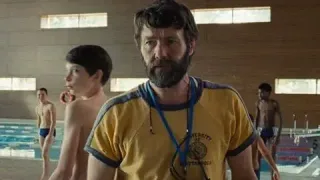August 23, 2022
Review: 'Poser' Explores Columbus Music Scene's Queer-adjacence
Joshua Polanski READ TIME: 5 MIN.
"In the fourteenth century, the great minds of the time gathered in Florence –sharing music, poetry, fashion. Old North is like modern Florence," says the timid and deadpan Lennon Gates (Sylvie Mix), a perpetual podcaster and recorder of sounds of the music scene in Columbus, Ohio. She believes this with full sincerity– and as the title of the film "Poser" suggests, she so desperately wants to be part of the scene.
Set in the ultra-local indie music in Columbus, directors Ori Segev and Noah Dixon wisely populate their affectionately-shot indie film with real performers from the local scene, most notably Bobbi Kitten (as herself) from Damn the Witch Siren.
Lennon records interviews for her podcast about the musicians in Old North but never produces a complete episode. In between stealing lyrics from her interview subjects, she becomes infatuated with the queer-coded and transgressive Bobbi Kitten, whose music is described as speaking to sexual awakenings. Bobbi's musical partner, Z Wolf (himself), wears a wolf mask (more "Creep" than furry) the entire film but mostly lurks in the background.
The opening credits give more prominence –in physical space and time on screen– to the names of the musicians in front of and behind the screen than it does to the directors, a gesture that speaks to where the pulse of the movie lies: the gritty venues, neon-lit bars, and often queer spaces where this music is encountered. First-time directors Segev and Dixon appear adorably and infectiously genuine in their love for these obscure artists.
Mix might be the star, but the movie is at its best when it's with Bobbi. On top of being the most musically talented artist featured, her cool pink hair and Bowie-inspired sexually brazen and traditionally feminine aesthetic automatically make her the film's most compelling and eclectic character. (Huge Bowie fan, over here.) She also equips herself with a performative purr much like some of Aubrey Plaza's bolder roles and at times almost appears romantically suggestive to Lennon but not quite. The unattainable object of desire, Bobbi maintains the mystique and threatening allure that makes her all so cool.
Mix's Lennon is less interesting but nonetheless compelling in her lost-ness. In love with artists more than art, the character calls for a degree of deadpan aloofness, almost camp, that's hard to deliver but is managed well by Mix, who appears to be the only performer with previous acting credits.
"Do you like music?" a stoned man philosophizing about folded potato chips asks her on a sleazy couch.
"Yeah, I like music," she replies, repeating the question in full rather than the more concise and natural, "Yeah."
The trailer markets some queer material, and while it doesn't fib its promises, it's safer to call "Poser" queer-adjacent. Almost everything explicitly queer finds itself packed into the trailer. Of course, queer people are allowed to have lives outside of their sexuality, something that goes too quickly by the wayside with many critics.
And given this is an indie art scene, it seems reasonable to assume a fair amount of artists in front and behind the screen identify as queer in some way or another.
Damn the Witch Siren's music videos, for example, often feature women kissing women, and, in one case, according to their website, feature "various members of Columbus' LGBTQ community singing along to what has become a local summer anthem."
Beyond explicitly queer material, the production aesthetic of the trailer also promises bisexual lighting variations, punk rock, and "gay glances," all of which it gleefully delivers. In fact, the lack of an explicitly sexual relationship between Lennon and Bobbi likely saves the film from dissipating most of the merited tension between the two leads. The relationship is built upon the promise of potentiality rather than the deliverance of any earnest emotionality.
In a scene at a performance art show, Bobbi asks the borderline-stalkerish Lennon to mimic her moves. As the mimicry continues, Bobbi mimics Lennon, who was mimicking her to begin with. Physical and intimate, the implicitly erotic scene has the same function as most sex scenes.
To move the potential to the actual would have been a grave error, a narrative wall the filmmakers seem well aware of.
Unfortunately, Segev and Dixon give a little too much attention to the musicians themselves, resulting in some sub-par filmmaking. Emblematic of their lack of care is the quote I opened with.
Coming from Lennon alongside the beginning of the "Episode 4" title card, it doesn't quite make sense. "Old North is like modern Florence" is an untrue, and, likely, unintended, statement; it's a direct comparison of the Columbus neighborhood to the modern Italian city. I almost guarantee the intended line read was "Old North is like a/the modern Florence."
The slip-up is minor, and most people won't notice it, but it's emblematic of the film's occasional anti-cinematic mistakes. And the way too many close-ups feel like they come from a place of too great admiration for the performers' musical careers, as if the camera knows this is their fifteen minutes and it wants it to be a glorious one.
There's something to admire in that childlike revel, but it still comes off a bit tacky. The close-up, as the cliché goes, is the most powerful weapon in all of cinema; to overuse the shot type is akin to nerfing the very thing that made it powerful.
Moreover, the intimate cinematography at times contradicts the distance at which Lennon finds herself from the music scene that she tries scamming her way into.
A more distanced and disciplined camera might have fixed this, but that would require minimizing that window of fame just a little bit more – a creative choice unacceptable to these filmmakers, who come from the scene themselves.
In more than one way, "Poser" owes something to "Breathe," the 2014 French lesbian romance drama directed by famed actor Mélanie Laurent. In "Breathe," Charlie (Joséphine Japy) befriends – and, eventually, more than befriends – Sarah (Lou de Laâge), who subsequently becomes bored with Charlie. Seeing Sarah as the ideal version of herself, Charlie creepily imitates the behavior and style of her would-be partner.
The film ends in a horribly unexpected, painfully operatic fashion. As the title suggests, "Poser" also features some "posing." As the music scene in Old North discovers the lyric thief amongst them, shit hits the proverbial fan.
But the similarity between the two films doesn't end there. In the tradition of "The King of Comedy," "Breathe" concludes with a genre bait-and-switch ending that hits like a horrific train. "Poser" replicates this, literally. It's a shame it couldn't be more, well, original in the process.
www.loosefilms.com
www.damnthewitchsiren.com
Help keep the Bay Area Reporter going in these tough times. To support local, independent, LGBTQ journalism, consider becoming a BAR member.






